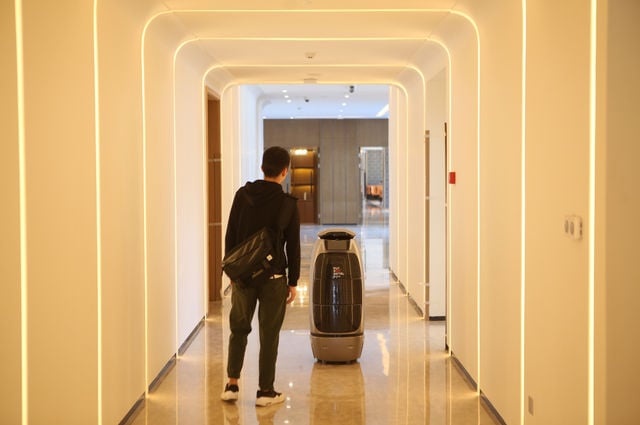Is 2025 the year for robots in Hotels?
9 experts shared their view
Rising costs and shortages of available labor are major problems facing the hotel industry. Whether it is the potential use of autonomy to eliminate some tasks like food delivery and cleaning public spaces or co-bots to assist associates in becoming more efficient and productive, robots are a potential part of the solution to staffing challenges.
How do you see robots potentially impacting hotels and where can they make the most difference?
Robotic cleaning of lobby and corridor areas make sense, plus robotic grass cutting. Less relevant for room cleaning given the corners and obstacles, although Neom is exploring this. Car parking via flat bots that rise up and lift the car off its wheels also work well and can optimise space in limited car parks. Amazon are leading with similar bots in their massive warehouses to move pallets around.
Room service delivery via robots appears in some current hotels but it's more a PR stunt. Ok for cold beverages, but food would be cold before it's delivered given the necessarily torturously slow and cautious rate of the devices. In Yotel NYC we still have "Yobot" (a repurposed bot from a car assembly line) which puts luggage away and retrieves it, and it's very popular, although more as an Instagram backdrop. Best to keep bots away from guest-facing activities like checkin, unless your hotel is a deliberate tech showcase like some of the Japanese pod hotels. Also, a good chef would throw a bot of of his/her kitchen window and rightly so. Food prep is a science and an art. Bot food prep might work in a dark kitchen for pizzas.
This year labor costs in hospitality consume 1/3 of hotel revenue (STR) and robotization and automation are becoming increasingly appealing to hotel owners and operators.
Ex. Robots like Rosie by Tailos, thousands of which have already been deployed at various hotels, clean guest rooms 20 percent faster and public areas up to 80 percent faster than human housekeepers. Robot waiters by Keenon Robotics and Bear Robotics are already deployed in over 25,000 restaurants worldwide and replace 100% of the waitstaff.
There are three main impediments to fast robotization of hospitality: a) reluctance to invest in new technologies by real-estate minded owners and operators, b) lack of understanding and fear of new technology:
Who will deal with it? I don't have trained staff to deal with it. It makes operations very complex, and c) The labor unions in cities with highly-unionized hospitality labor force are against any robotization or any technology advancement that can reduce the number of paying members.In my view, none of the above can stop the rapid advancements in the adoption of robotics and automation in our industry, in the same manner as the Luddite movement in early 19th century England could not stop the Industrial Revolution.
Of course! We've seen robots in progressive hotels and resorts for years. You're right that cleaning and innovative food delivery are the easier pickings. But we should discuss that bright red line that starts and ends with the front desk. It isn't robotics but smart locks and key dispersal services that has enabled us to provide ways to avoid the front desk - and those technologies will only improve and draw more guests to use them over time. With aps and integration into the PMS, it is becoming trivial to offer direct and pre-check-in services. But that too will come to many more properties soon. The bright red line goes in several directions. Four and five star properties will be expected to provide quality front desk services into the long-term future. Front desk robots were a short-term novelty. The real gains will be in improved guest service using AI to predict wants and needs by accumulating personal information from sources inside and outside of the hotel and chain boundaries. These are exciting times for those of us in technology!
When we consider the idea of robotics as a consistent producer of process in hospitality, it's not new. Particuarly when we remember that robots as a term, does not only apply to the idea of our humanoid like friends as an accomplice to tasks that we might need to fulfil.
My view has been that as much as there is opportunity for our humanoid friends, it's more likely that the rise of adoption will occur through software driven robots or the term often used, Robotic Process Automation.
RPA has significant opportunity for adoption and in many cases is well on the way. It's far less intrusive from the perspective of visiblity. Far less hard tech involved as it is essentially a software program. Therefore, far more accepted, affordable and deployed as it does not seem so confronting to the traditional human workforce.
Today, software is a generally accepted bona fide productivity tool in our industry. Thus making software driven RPA an easier path to adoption. R2D2 and co will take a little longer as a direct physical displacement of the human workforce.
We are on the way, but 2025 won't be the tipping year!
At Alliants, we believe that technology—whether it's robots, AI, or even something as simple as an automated can opener—should always work with your team.In the luxury sector, guests are already accustomed to using technology. They often prefer using their own devices to communicate with service providers. Messaging, in particular, has been incredibly successful for our luxury clients, with engagement rates reaching as high as 70% at some properties. We've designed these interactions to feel highly personalised, so guests never feel like they're speaking to a generic chatbot.We see technology as a powerful tool to help luxury hotels achieve their ultimate goal: fast, personalised service. It can act as your trusted assistant, your efficient data processor, or even your behind-the-scenes support, working tirelessly to enhance guest experiences.However, when integrating technology into your operations, it"s vital to remember that you're always in control. Technology won't make decisions for you—it won"t accidentally overheat the hot tub or teach inappropriate phrases to guests" children. You control the service, the guest experience, and how technology supports your team. It"s a partnership you curate, oversee, and fine-tune every step of the way.
If you haven't yet integrated robotics projects into your hotel, you're missing out on a unique opportunity. Two technologies are revolutionizing the hotel industry: artificial intelligence (AI) and robotics. While AI grabs the spotlight, robotics, which receives less attention, will have an undeniable impact on hotel management. Robotics will also benefit from AI, as demonstrated by NVIDIA's proposal: Generative Physical AI. So, to the question of whether robotics will transform the hotel industry, the answer is a resounding yes.
Robotics is already mature. In recent pilot projects that I have led, current robots have minimal failure rates in tasks such as cleaning, logistics, and even in the kitchen with programmed robotic arms. The benefits are clear: they perform tasks more efficiently that no worker wants to do, and at costs below €2/hour.
However, the challenges of this technology, based on my experience, are threefold: you must completely rethink the operations of the hotel departments that use them, work on the collaboration between workers and clients, and finally, we must start thinking about redesigning hotels, buffets, kitchens, and back-office areas. These spaces need to be designed for robots, without people.
Whether 2025 is the year for hotel robots depends mainly on how we define "robots." If we're referring to physical, humanoid machines, like those seen at the Henn na Hotel in Osaka, Japan, the answer is a clear NO. While these robots attract attention, they often provoke the "uncanny valley" effect, making guests uncomfortable, and their practical utility in hospitality remains limited. However, if by "robots" we mean software-based Robotic Process Automation, then the answer is a resounding YES.
The hospitality industry, struggling with a severe labor shortage, has found that traditional solutions like wage increases and flexible hours are no longer sufficient. As of mid-2023, 82% of hotels report staffing shortages, with 26% describing the situation as "severe."
This presents a clear opportunity: "Digital workers" (a term I prefer over "robots") can help hotels maintain the expected level of guest service, even with a reduced human workforce. They also sidestep the unsettling nature of physical robots, offering a seamless and scalable solution without the discomfort associated with near-human machines.
So, while 2025 is unlikely to be the year of humanoid robots in hotels, it very well could be when digital workers transform the industry behind the scenes.
The answer is both Yes and No.
Yes, 2025 will be the year for robots in hotels because thousands of new hotels will adopt robots for cleaning, room service delivery, information provision and other tasks to compensate for the labour shortages. However, the overall number of hotels that will have implemented robots in their operations will remain a minuscule share of the total number of hotels globally.
In 2025, the hotel industry will continue to have a very low level of robotisation and the reasons are several:
- Robots need better technical capabilities to fulfil their intended tasks flawlessly. People tend to set high expectations for technology"s performance.
- Robotic solutions remain relatively expensive which makes them affordable to mid- and large scale hotels.
- Most robotisation projects rely on partial automation of processes rather than full automation. Some tasks remain unautomated and may create more work for the employees rather than make them more efficient.
As a whole, the economic fundamentals of robotic technologies play a vital role in their adoption by the hotel industry.
By now, it is safe to say that robots are definitely taking over most hotel operations. Robots can certainly automate tasks and improve efficiency, taking over repetitive tasks that do not require human intelligence and stepping in as an ideal solution for the industry's labour shortage. Hilton's robot concierge, Connie and Henn-na Hotel in Nagasaki, Japan, which is the world's first hotel staffed entirely by robots, is proof of that.
However, can robots replace the human touch that makes hospitality 'hospitable'? Can they replicate the socio-emotional skills of human employees to understand guests' needs? Artificial intelligence automates and reduces the responsibilities of humans, but at the end of the day, hospitality is about more than just efficiency. It is doubtful whether it is a sustainable solution to the labour shortage in hospitality.
While robots will play a bigger role in hotels next year and beyond, hospitality will remain a human-dominated industry.










